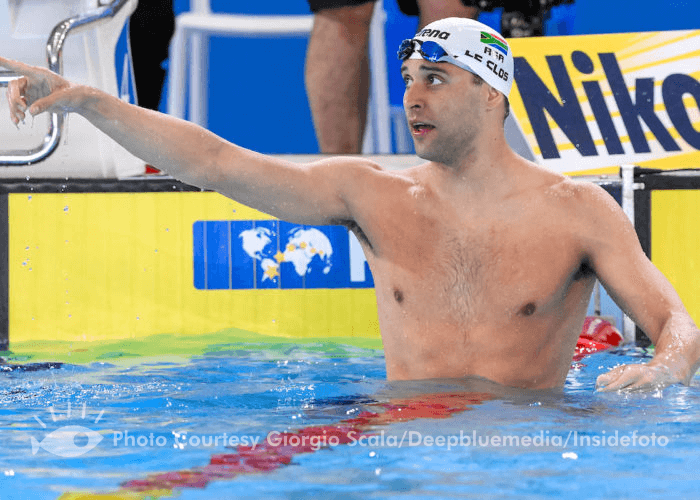The Importance of Finding Your ‘Why’ in Swimming: Appreciating This Special Sport

The Importance of Finding Your ‘Why’ in Swimming
The alarm on your bedside table goes off at 5 a.m. Your room is pitch black, the covers are keeping you warm and cozy, and the last thing you want to do is get out of bed. Why do I have to get up so early?
You somehow manage to make it to the pool. You stand on the deck, staring at the chilly abyss in front of you. You know that as soon as you jump in, you’ll be overwhelmed by the freezing cold water. Why do I have to get in right now?
You dig up the guts to dive in, slug your way through warmup, and you’ve made it to the main set. It’s a tough one – 10 x 200s at threshold pace. Groans and complaints arise from around the pool. This is going to be long, painful, and exhausting. Why do I even do this sport?
Finding your why.
The first time I heard the phrase was in a research class at my high school. Our teacher was trying to motivate us to construct a topic for a year-long project. It was made clear that the topic should be meaningful to us, and we should have a true purpose for our selection.
I never thought that I would correlate this phrase to the sport of swimming, but throughout my senior year of high school, I found myself doing it quite often. In fact, without even realizing it, my “whys” became the fuel that powered me through practices each and every day.
Like so many others, my senior year was the classic “roller coaster of a season.” It was filled with many ups and downs, leading to a multitude of times where my emotions would get the best of me. There were times where I simply didn’t know what to do, and times where I wanted to quit.
In these times, I learned to rely on my “whys.” I found this approach to be a fantastic mental strategy that helped keep me motivated and focused on what was truly important within my swimming journey. While I have many reasons that I love to swim, here are three main ones that I hope can help carry others who may be struggling.
Why #1: Physical and Emotional Health
This is the obvious one. There is no question that swimming is one of the best sports for someone’s physical well-being. The sport works all of the body’s main muscle groups. Kicking strengthens the legs. Holding oneself above the water will build a strong core. The constant pulling motion will lead to powerful arms. Along with muscular development, swimming greatly aids in cardiovascular health. Not only are you challenging your muscles, but you are doing so while underwater. This leads to a taxing workout of the heart and lungs, resulting in significant endurance gains.
Aside from physical advantages, swimming also provides people with emotional benefits. Exercise of any type releases endorphins, which are a group of hormones that stimulate a painkilling effect. So, the “high” that many people feel after swimming is actually chemically induced. Additionally, swimming can increase the amount of specific neurotransmitters in your brain, including serotonin. These are “feel good” neurotransmitters that do just that – make you happier!
Why #2: Your Younger Self Would Be Proud
Sometimes, looking to the future is great. We can set goals and strive to improve ourselves over a period of time. However, at other points, it can be destructive to our self-motivation and confidence. Missed the state championship qualifying time? I’ll never get to perform in front of college coaches, and now I’ll never get recruited. As swimmers, most of the time we are looking at what comes next. This can lead to an unnecessary amount of stress.
Sometimes, the best cure for a worry of the future is to look into the past. At some point in our careers, we will struggle to find a reason to continue pursuing the sport. However, somewhere deep within us is the kid who decided to jump into the pool for the first time. In difficult times in our sport, it can be helpful to imagine an interaction with your younger self. How much have you progressed since then? What made you begin swimming in the first place? Most of the time, doing something for a previous version of yourself can be just the motivation you need to get back on track.
Why #3: There Are People That Can’t
“I have to go to practice today.” It’s a common statement that we have all made at some point in time. It makes practice seem like a chore that we’re dreading. The reality is, we never have to go to practice…although it sometimes may seem that way. Getting up, throwing on a bathing suit, and strapping on a pair of goggles is something that we don’t have to do. Rather, we get to do it.
In our world, we are surrounded by people who are physically disabled due to no fault of their own. Someone can make the brave choice to go overseas to serve our country and come back paralyzed. Another person can be born with a disability that makes swimming physically impossible. Even swimmers could suffer an injury that keeps them out of the sport permanently.
Recognizing that not everyone has the ability to pursue a sport can work as a great “why.” Many people would give everything to be able to swim or take part in any sort of athletic endeavor. It is important that we always be grateful that we have the ability to do what we do. When you dive in the pool, think about those who can’t, and do it for them.



